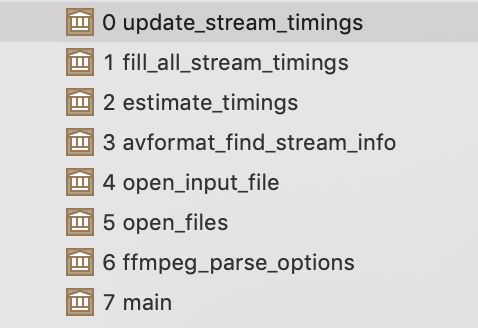- 【视频】m3u8相关操作
郭老二
视频音视频
1、视频文件转m3u81.1常用命令1)默认只保留5个ts文件ffmpeg-iinput.mp4-start_number0-hls_time10-hls_list_size0-fhlsstream1.m3u82)去掉音频-an,保留全部ts文件ffmpeg-iinput.mp4-vfscale=640:480-an-start_number0-hls_time10-hls_list_size0-
- ffmpeg录屏
_洛_神
音视频音视频
qt+ffmpeg屏幕录制软件完整工程链接:https://download.csdn.net/download/weixin_42538789/85013858测试代码#include#include"screencapture.h"#includeusingnamespacestd;intmain(intargc,char*argv[]){QCoreApplicationa(argc,argv
- Java使用FFmpegFrameGrabber进行视频拆帧,结合Thumbnails压缩图片保存到文件夹
Acmen-zym
JavaJavaIOjava音视频开发语言
引入依赖net.coobirdthumbnailator0.4.17org.bytedecojavacv1.5.7org.bytedecojavacv-platform1.5.7视频拆帧处理publicstaticvoidmain(String[]args){Filefile=newFile("C:\\Users\\EDY\\Desktop\\frame");File[]files=file.li
- taosdump备份多个数据库近10天的数据
会飞的土拨鼠呀
运维学习笔记数据库oracle
以下是使用taosdump备份多个指定数据库近10天数据的详细步骤:方法1:直接指定多个数据库名称通过--databases参数直接指定多个数据库,逗号分隔:#!/bin/bash#定义备份目录和时间范围BACKUP_DIR="./backup"START_TIME=$(date-d"10daysago""+%Y-%m-%d%H:%M:%S")END_TIME=$(date"+%Y-%m-%d%H
- python3+ffmpeg下载B站视频,附代码
才华横溢吴道简
爬虫pythonwindows
最近要去外面玩,旅途漫长,于是乎,就写了个代码,从B站上下载纪录片看,代码附后,请自取,如果觉得有用,麻烦点个赞,鼓励一下。感谢~~一、下载安装ffmpegFfmpeg是一款自由软件,用于视频和音频文件的处理,在本例中,我使用它进行视频文件和音频文件的合并。合并代码写在python脚本中,你只需下载好ffmpeg即可,而且因为合并代码中使用ffmpeg的绝对路径,所以也不用设置环境配置。Ffmpe
- 如何使用 Python 和 FFmpeg 下载 B站视频
木觞清
7天熟练Pythonpythonffmpeg音视频
在这篇文章中,我们将讨论如何使用Python脚本结合FFmpeg下载并合并B站视频的流,生成一个完整的视频文件。具体来说,我们将通过B站的API获取视频的音频和视频流,然后使用FFmpeg下载并将它们合并成一个.mp4文件。前提条件Python:你需要安装Python,推荐使用Python3.6或更高版本。FFmpeg:确保你已经安装并配置好了FFmpeg。如果尚未安装,可以参考FFmpeg官方网
- 【ai】mocap:conda 安装python3.8+ cuda+ pytorch+torchaudio、torchvision
等风来不如迎风去
AI入门与实战人工智能ubuntuconda
MotionCapubuntu18.04不知道为啥会依赖于ffmpeg、xorg渲染?安装pytorch就是会带上cudacudnn啥的pytorch【ai】tx2nx:安装torch、torchvisionforyolov5这里就发现pytorch和torchvision有依赖关系的,还涉及到rapidjson所以python的环境隔离很重要。核心库-cudatoolkit=11.3-pytor
- 视频转音频, 音频转文字
言之。
python音视频
Ubuntu24环境准备#系统级依赖sudoaptupdate&&sudoaptinstall-yffmpegpython3-venvgitbuild-essentialpython3-dev#Python虚拟环境python3-mvenv~/ai_summarysource~/ai_summary/bin/activate核心工具链工具用途安装命令Whisper语音识别pipinstallope
- 解决 开发FFMPEG视频播放器右侧白色线问题
吃面不喝汤66
OBS二次开发ffmpeg音视频
在开发基于Qt和FFmpeg的视频播放器时,我遇到一个常见但令人困惑的问题:在使用VideoWidget(继承自QOpenGLWidget)播放某些视频时,窗口右侧会出现一条白色线。这不仅影响视觉效果,还可能暴露潜在的渲染或缓冲区问题。本文将详细分析这一现象的成因,并提供经过验证的解决方案。问题现象在使用自定义的VideoDecoder和VideoWidget类播放视频时,大多数视频都能正常显示,
- ffmpeg+ubuntu16.04编译ffmpeg库
小gpt&
QT+FFMPEG实战ffmpeglinux
个人使用环境:ubuntudesktop16.04+ffmpeg4.2.1以下的库进行完整编译ffmpeg介绍FFmpeg是一个开源的多媒体框架,广泛用于处理音频、视频、字幕等多媒体数据。它包含了丰富的工具和库,能够进行音视频的编解码、转码、流媒体处理、滤镜应用等操作。FFmpeg是许多多媒体应用程序和工具的核心引擎,功能强大且灵活,支持几乎所有常见的音视频格式。FFmpeg的主要组成部分ffmp
- 从零实现B站视频下载器:Python自动化实战教程
木觞清
#编程语言自动化运维
一、项目背景与实现原理1.1B站视频分发机制Bilibili的视频采用音视频分离技术,通过以下方式提升用户体验:动态码率适配(1080P/4K/HDR)分段加载技术(基于M4S格式)内容保护机制(防盗链/签名验证)1.2技术实现路线graphTDA[模拟浏览器请求]-->B[获取加密播放信息]B-->C[解析音视频地址]C-->D[多线程下载]D-->E[FFmpeg合并]二、代码逐层解析2.1请
- 从FFmpeg命令行到Rust:多场景实战指南
Yeauty
ffmpegrustvideo-codec
FFmpeg作为功能强大的多媒体处理工具,被广泛应用于视频编辑、格式转换等领域。然而,直接使用FFmpeg的命令行界面(CLI)可能会遇到以下挑战:命令复杂度高:FFmpeg的命令行参数众多且复杂,初学者可能难以掌握,配置错误时调试困难。集成困难:在Rust等现代编程语言中,直接调用FFmpeg的C语言API需要处理复杂的内存管理和安全性问题,可能引发内存泄漏、非法访问等问题。为了解决这些问题,R
- 从FFmpeg命令行到Rust:多场景实战指南
FFmpeg作为功能强大的多媒体处理工具,被广泛应用于视频编辑、格式转换等领域。然而,直接使用FFmpeg的命令行界面(CLI)可能会遇到以下挑战:命令复杂度高:FFmpeg的命令行参数众多且复杂,初学者可能难以掌握,配置错误时调试困难。集成困难:在Rust等现代编程语言中,直接调用FFmpeg的C语言API需要处理复杂的内存管理和安全性问题,可能引发内存泄漏、非法访问等问题。为了解决这些问题,R
- linux CentOS 7.9 安装 ffmpeg 6.0 教程【亲测成功】
刘登辉
ffmpeglinuxcentos
查看当前系统版本[
[email protected]]#lsb_release-aLSBVersion::core-4.1-amd64:core-4.1-noarchDistributorID:CentOSDescription:CentOSLinuxrelease7.9.2009(Core)Release:7.9.2009Codename:Corewgethttp://www.ffm
- 常用的ffmpeg文件格式转换指令
儿孙未解供耕织
linux嵌入式ffmpeg
mp3转wav:ffmpeg-iinput.mp3-acodecpcm_s16le-ac2-ar44100output.wavwav转m4a:ffmpeg-fwav-itest.wav-ar48000-acodecaac-vn-dntest.m4amp3转mp4:ffmpeg-iREC_START.mp3-codeccopyREC_START.mp4m4a转wav:ffmpeg-iinput.m4
- FFMPEG实现音频重采样
QQ_1695710968
音频重采样FFMPEGPCM
技术在于交流、沟通,转载请注明出处并保持作品的完整性。原文:https://blog.csdn.net/hiwubihe/article/details/81259134[音频编解码系列文章]音频编解码基础FFMPEG实现音频重采样FFMPEG实现PCM编码(采用封装格式实现)FFMPEG实现PCM编码(不采用封装格式实现)FAAC库实现PCM编码FAAD库实现RAW格式AAC解码FAAD库实现R
- 工业相机视频播放(RTSP)
CHHC1880
工业相机rtspffmpeg推流
需求:工业相机图像能在rtsp流上播放。实现手段:C#利用工业相机的SDK拿到图后,通过ffmpeg管道推给流媒体程序,再转流播放。模拟测试:两张图在rtsp上进行轮播
- 二.使用ffmpeg对原始音频数据重采样并进行AAC编码
djykkkkkk
ffmpeg学习ffmpeg音视频aac
重采样:将音频三元组【采样率采样格式通道数】之中的任何一个或者多个值改变。一.为什么要进行重采样?1.原始音频数据和编码器的数据格式不一致2.播放器要求的和获取的数据不一致3.方便运算二.本次编码流程1.了解自己本机麦克风参数,我的切换为44100/16/2;包括麦克风录音的size可能不一样,本机windows下录音的size为88200;1.ffmpeg获取麦克风数据2.ffmpeg对数据进行
- 一.ffmpeg打开麦克风,录制音频并重采样
djykkkkkk
ffmpeg学习ffmpeg音视频
一.windowswindows下使用msys编译ffmpeg,先编译libx264和libx265,然后编译ffmpeg的时候需要添加这两个库的路径才能--enable;为什么ffplay--enable了还是没有呢,仔细看编译打印,可能刚有一段报错提示SDL找不到,这个时候咱们就直接使用msys安装SDL,然后--enable启动sdl,这样ffplay就可以编译成功了。参考这个博主:FFmp
- 【音视频】ffmpeg中AVpacket解析NALU总结
gma999
音视频ffmpeg
概述项目中涉及到一些向国标平台推送视频流的逻辑,因之前没有接触过该方面的知识,所以开始走了很多错误的路线,本文主要总结H265视频中解析出NALU方法代码实现输出[tcp@0x55842b7e60]Nodefaultwhitelistset[tcp@0x55842b7e60]Originallistofaddresses:[tcp@0x55842b7e60]Address192.168.1.181
- laravel项目中使用FFMPeg 剪裁视频
道系女孩~
phplaravel
#运行环境需安装的软件ffmpeg#安装的扩展pbmedia/laravel-ffmpeg:^8.3#扩展文档https://packagist.org/packages/pbmedia/laravel-ffmpeg#引入的类useFFMpeg\Coordinate\TimeCode;useFFMpeg\Format\Video\X264;useFFMpeg\Exception\RuntimeEx
- 音视频入门基础:RTP专题(18)——FFmpeg源码中,获取RTP的音频信息的实现(上)
崔杰城
音视频技术FFmpeg源码分析音视频ffmpeg
由于本文篇幅较长,分为上、下两篇。一、引言通过FFmpeg命令可以获取到SDP描述的RTP流的的音频压缩编码格式、音频压缩编码格式的profile、音频采样率、通道数信息:ffmpeg-protocol_whitelist"file,rtp,udp"-iXXX.sdp而由《音视频入门基础:RTP专题(17)——音频的SDP媒体描述》可以知道,SDP协议中,a=rtpmap属性和a=fmtp属性中的
- Qt+ffmpeg环境搭建
技术不支持
qtffmpeg开发语言
Qt+ffmpeg环境搭建各平台常见视频开发库举例:iOS:AVFoundationAudioUnitAndroid:MediaPlayer,MediaCodecWindows:DirectShowLinux:GStreamerFFmpeg库是一个跨平台的视频开发库,还有libVLC也是一个跨平台的视频开发库掌握了其中一个库,也能很快上手其它库,因为音视频解码的原理类似引入FFmpeg库有两种方式
- QT+FFmpeg+Windows开发环境搭建(加薪点)
Qt历险记
Qt高级开发工程师qtffmpegwindows
01、Windows环境搭建FFMPEG官网:http://ffmpeg.org/02、下载4.2.1版本源码源码:https://ffmpeg.org/releases/ffmpeg-4.2.1.tar.bz203、下载4.2.1编译好的文件下载已经编译好的FFMPEG)(迅雷下载很快)网址:https://ffmpeg.zeranoe.com/builds/32位下载地址:
- Qt | Windows环境搭建ffmpeg
Qt历险记
Qt高级开发工程师qtwindowsffmpeg
点击上方"蓝字"关注我们FFMPEG官网>>>http://ffmpeg.org/【下载4.2.1版本源码】源码:https://ffmpeg.org/releases/ffmpeg-4.2.1.tar.bz2【下载4.2.1编译好的文件】下载已经编译好的FFMPEG网址:https://ffmpeg.zeranoe.com/builds/
- Python爬虫教程:如何通过接口批量下载视频封面(FFmpeg技术实现)
Python爬虫项目
python爬虫开发语言数据库数据分析scrapyselenium
引言随着在线视频平台的蓬勃发展,视频封面作为视频内容的预览图,一直以来都是观众对视频的第一印象。在爬取视频资源时,很多开发者和研究者往往只关注视频本身,而忽略了视频封面。实际上,视频封面不仅能提供重要的信息(例如视频标题、主题或情感等),而且它们也能作为数据集中的重要属性,用于视频分类、推荐系统等应用。在这篇博客中,我们将深入探讨如何使用Python通过接口批量下载视频封面,利用FFmpeg等技术
- 三分钟掌握音视频信息查询 | 在 Rust 中优雅地集成 FFmpeg
Yeauty
音视频rustffmpeg
前言在音视频处理领域,开发者常常需要获取媒体文件的详细信息,如时长、格式、元数据,以及音视频流的编码参数等。这些信息对于媒体管理、转码调度、播放控制等场景至关重要。然而,直接使用FFmpeg命令行工具或其原生API存在以下挑战:命令行工具的复杂性:FFmpeg的命令行参数众多且复杂,使用不当可能导致错误。例如,处理包含空格的文件名时,需要特别注意正确的转义和引用方式,否则可能导致无法识别文件名的问
- 『FFmpeg学习笔记』MAC系统电脑安装FFmpeg以及使用
AI大模型前沿研究
大模型笔记macosffmpegM1
MAC系统电脑安装FFmpeg文章目录一.安装FFmpeg1.1.MACbrew安装FFmpeg1.2.MAC官网下载FFmpeg压缩包1.3.Windows安装1.4.Linux安装二.FFmpeg的使用2.1.音频操作2.1.1.如果不转换,直接输出aac2.1.2.将音频输出为wav2.1.3.将aac转换为wav2.1.4.双声道分离2.1.5.使用FFmpeg将音频和视频合并2.2.字幕
- MPV Player(MPV播放器)
fhfhgfdgdsgi1
tornado
链接:https://pan.quark.cn/s/a6b4b644bb16MPVPlayer(MPV播放器)是mplayer2和MPlayer的一个分支,支持多种视频文件格式、音频和视频编解码器以及字幕类型。它通过FFmpeg提供硬件加速,支持VDPAU和VAAPI以及Windows上的DXVA2,以及VDA和VideoToolbox视频。mpv可以播放互联网广播流、视频流、“实时”应用各种音频
- 【视频】ffmpeg、Nginx搭建RTMP、HLS服务器
郭老二
视频音视频ffmpegnginx
1、源码安装Nginx1)源码下载因为要使用Nginx的模块nginx-rtmp-module,所以要下载nginx和nginx-rtmp-module的源码。下载地址:http://nginx.org/en/download.htmlhttps://github.com/arut/nginx-rtmp-module/tags2)解压、配置在同一个目录中解压nginx和nginx-rtmp-mod
- 强大的销售团队背后 竟然是大数据分析的身影
蓝儿唯美
数据分析
Mark Roberge是HubSpot的首席财务官,在招聘销售职位时使用了大量数据分析。但是科技并没有挤走直觉。
大家都知道数理学家实际上已经渗透到了各行各业。这些热衷数据的人们通过处理数据理解商业流程的各个方面,以重组弱点,增强优势。
Mark Roberge是美国HubSpot公司的首席财务官,HubSpot公司在构架集客营销现象方面出过一份力——因此他也是一位数理学家。他使用数据分析
- Haproxy+Keepalived高可用双机单活
bylijinnan
负载均衡keepalivedhaproxy高可用
我们的应用MyApp不支持集群,但要求双机单活(两台机器:master和slave):
1.正常情况下,只有master启动MyApp并提供服务
2.当master发生故障时,slave自动启动本机的MyApp,同时虚拟IP漂移至slave,保持对外提供服务的IP和端口不变
F5据说也能满足上面的需求,但F5的通常用法都是双机双活,单活的话还没研究过
服务器资源
10.7
- eclipse编辑器中文乱码问题解决
0624chenhong
eclipse乱码
使用Eclipse编辑文件经常出现中文乱码或者文件中有中文不能保存的问题,Eclipse提供了灵活的设置文件编码格式的选项,我们可以通过设置编码 格式解决乱码问题。在Eclipse可以从几个层面设置编码格式:Workspace、Project、Content Type、File
本文以Eclipse 3.3(英文)为例加以说明:
1. 设置Workspace的编码格式:
Windows-&g
- 基础篇--resources资源
不懂事的小屁孩
android
最近一直在做java开发,偶尔敲点android代码,突然发现有些基础给忘记了,今天用半天时间温顾一下resources的资源。
String.xml 字符串资源 涉及国际化问题
http://www.2cto.com/kf/201302/190394.html
string-array
- 接上篇补上window平台自动上传证书文件的批处理问卷
酷的飞上天空
window
@echo off
: host=服务器证书域名或ip,需要和部署时服务器的域名或ip一致 ou=公司名称, o=公司名称
set host=localhost
set ou=localhost
set o=localhost
set password=123456
set validity=3650
set salias=s
- 企业物联网大潮涌动:如何做好准备?
蓝儿唯美
企业
物联网的可能性也许是无限的。要找出架构师可以做好准备的领域然后利用日益连接的世界。
尽管物联网(IoT)还很新,企业架构师现在也应该为一个连接更加紧密的未来做好计划,而不是跟上闸门被打开后的集成挑战。“问题不在于物联网正在进入哪些领域,而是哪些地方物联网没有在企业推进,” Gartner研究总监Mike Walker说。
Gartner预测到2020年物联网设备安装量将达260亿,这些设备在全
- spring学习——数据库(mybatis持久化框架配置)
a-john
mybatis
Spring提供了一组数据访问框架,集成了多种数据访问技术。无论是JDBC,iBATIS(mybatis)还是Hibernate,Spring都能够帮助消除持久化代码中单调枯燥的数据访问逻辑。可以依赖Spring来处理底层的数据访问。
mybatis是一种Spring持久化框架,要使用mybatis,就要做好相应的配置:
1,配置数据源。有很多数据源可以选择,如:DBCP,JDBC,aliba
- Java静态代理、动态代理实例
aijuans
Java静态代理
采用Java代理模式,代理类通过调用委托类对象的方法,来提供特定的服务。委托类需要实现一个业务接口,代理类返回委托类的实例接口对象。
按照代理类的创建时期,可以分为:静态代理和动态代理。
所谓静态代理: 指程序员创建好代理类,编译时直接生成代理类的字节码文件。
所谓动态代理: 在程序运行时,通过反射机制动态生成代理类。
一、静态代理类实例:
1、Serivce.ja
- Struts1与Struts2的12点区别
asia007
Struts1与Struts2
1) 在Action实现类方面的对比:Struts 1要求Action类继承一个抽象基类;Struts 1的一个具体问题是使用抽象类编程而不是接口。Struts 2 Action类可以实现一个Action接口,也可以实现其他接口,使可选和定制的服务成为可能。Struts 2提供一个ActionSupport基类去实现常用的接口。即使Action接口不是必须实现的,只有一个包含execute方法的P
- 初学者要多看看帮助文档 不要用js来写Jquery的代码
百合不是茶
jqueryjs
解析json数据的时候需要将解析的数据写到文本框中, 出现了用js来写Jquery代码的问题;
1, JQuery的赋值 有问题
代码如下: data.username 表示的是: 网易
$("#use
- 经理怎么和员工搞好关系和信任
bijian1013
团队项目管理管理
产品经理应该有坚实的专业基础,这里的基础包括产品方向和产品策略的把握,包括设计,也包括对技术的理解和见识,对运营和市场的敏感,以及良好的沟通和协作能力。换言之,既然是产品经理,整个产品的方方面面都应该能摸得出门道。这也不懂那也不懂,如何让人信服?如何让自己懂?就是不断学习,不仅仅从书本中,更从平时和各种角色的沟通
- 如何为rich:tree不同类型节点设置右键菜单
sunjing
contextMenutreeRichfaces
组合使用target和targetSelector就可以啦,如下: <rich:tree id="ruleTree" value="#{treeAction.ruleTree}" var="node" nodeType="#{node.type}"
selectionChangeListener=&qu
- 【Redis二】Redis2.8.17搭建主从复制环境
bit1129
redis
开始使用Redis2.8.17
Redis第一篇在Redis2.4.5上搭建主从复制环境,对它的主从复制的工作机制,真正的惊呆了。不知道Redis2.8.17的主从复制机制是怎样的,Redis到了2.4.5这个版本,主从复制还做成那样,Impossible is nothing! 本篇把主从复制环境再搭一遍看看效果,这次在Unbuntu上用官方支持的版本。 Ubuntu上安装Red
- JSONObject转换JSON--将Date转换为指定格式
白糖_
JSONObject
项目中,经常会用JSONObject插件将JavaBean或List<JavaBean>转换为JSON格式的字符串,而JavaBean的属性有时候会有java.util.Date这个类型的时间对象,这时JSONObject默认会将Date属性转换成这样的格式:
{"nanos":0,"time":-27076233600000,
- JavaScript语言精粹读书笔记
braveCS
JavaScript
【经典用法】:
//①定义新方法
Function .prototype.method=function(name, func){
this.prototype[name]=func;
return this;
}
//②给Object增加一个create方法,这个方法创建一个使用原对
- 编程之美-找符合条件的整数 用字符串来表示大整数避免溢出
bylijinnan
编程之美
import java.util.LinkedList;
public class FindInteger {
/**
* 编程之美 找符合条件的整数 用字符串来表示大整数避免溢出
* 题目:任意给定一个正整数N,求一个最小的正整数M(M>1),使得N*M的十进制表示形式里只含有1和0
*
* 假设当前正在搜索由0,1组成的K位十进制数
- 读书笔记
chengxuyuancsdn
读书笔记
1、Struts访问资源
2、把静态参数传递给一个动作
3、<result>type属性
4、s:iterator、s:if c:forEach
5、StringBuilder和StringBuffer
6、spring配置拦截器
1、访问资源
(1)通过ServletActionContext对象和实现ServletContextAware,ServletReque
- [通讯与电力]光网城市建设的一些问题
comsci
问题
信号防护的问题,前面已经说过了,这里要说光网交换机与市电保障的关系
我们过去用的ADSL线路,因为是电话线,在小区和街道电力中断的情况下,只要在家里用笔记本电脑+蓄电池,连接ADSL,同样可以上网........
- oracle 空间RESUMABLE
daizj
oracle空间不足RESUMABLE错误挂起
空间RESUMABLE操作 转
Oracle从9i开始引入这个功能,当出现空间不足等相关的错误时,Oracle可以不是马上返回错误信息,并回滚当前的操作,而是将操作挂起,直到挂起时间超过RESUMABLE TIMEOUT,或者空间不足的错误被解决。
这一篇简单介绍空间RESUMABLE的例子。
第一次碰到这个特性是在一次安装9i数据库的过程中,在利用D
- 重构第一次写的线程池
dieslrae
线程池 python
最近没有什么学习欲望,修改之前的线程池的计划一直搁置,这几天比较闲,还是做了一次重构,由之前的2个类拆分为现在的4个类.
1、首先是工作线程类:TaskThread,此类为一个工作线程,用于完成一个工作任务,提供等待(wait),继续(proceed),绑定任务(bindTask)等方法
#!/usr/bin/env python
# -*- coding:utf8 -*-
- C语言学习六指针
dcj3sjt126com
c
初识指针,简单示例程序:
/*
指针就是地址,地址就是指针
地址就是内存单元的编号
指针变量是存放地址的变量
指针和指针变量是两个不同的概念
但是要注意: 通常我们叙述时会把指针变量简称为指针,实际它们含义并不一样
*/
# include <stdio.h>
int main(void)
{
int * p; // p是变量的名字, int *
- yii2 beforeSave afterSave beforeDelete
dcj3sjt126com
delete
public function afterSave($insert, $changedAttributes)
{
parent::afterSave($insert, $changedAttributes);
if($insert) {
//这里是新增数据
} else {
//这里是更新数据
}
}
- timertask
shuizhaosi888
timertask
java.util.Timer timer = new java.util.Timer(true);
// true 说明这个timer以daemon方式运行(优先级低,
// 程序结束timer也自动结束),注意,javax.swing
// 包中也有一个Timer类,如果import中用到swing包,
// 要注意名字的冲突。
TimerTask task = new
- Spring Security(13)——session管理
234390216
sessionSpring Security攻击保护超时
session管理
目录
1.1 检测session超时
1.2 concurrency-control
1.3 session 固定攻击保护
- 公司项目NODEJS实践0.3[ mongo / session ...]
逐行分析JS源代码
mongodbsessionnodejs
http://www.upopen.cn
一、前言
书接上回,我们搭建了WEB服务端路由、模板等功能,完成了register 通过ajax与后端的通信,今天主要完成数据与mongodb的存取,实现注册 / 登录 /
- pojo.vo.po.domain区别
LiaoJuncai
javaVOPOJOjavabeandomain
POJO = "Plain Old Java Object",是MartinFowler等发明的一个术语,用来表示普通的Java对象,不是JavaBean, EntityBean 或者 SessionBean。POJO不但当任何特殊的角色,也不实现任何特殊的Java框架的接口如,EJB, JDBC等等。
即POJO是一个简单的普通的Java对象,它包含业务逻辑
- Windows Error Code
OhMyCC
windows
0 操作成功完成.
1 功能错误.
2 系统找不到指定的文件.
3 系统找不到指定的路径.
4 系统无法打开文件.
5 拒绝访问.
6 句柄无效.
7 存储控制块被损坏.
8 存储空间不足, 无法处理此命令.
9 存储控制块地址无效.
10 环境错误.
11 试图加载格式错误的程序.
12 访问码无效.
13 数据无效.
14 存储器不足, 无法完成此操作.
15 系
- 在storm集群环境下发布Topology
roadrunners
集群stormtopologyspoutbolt
storm的topology设计和开发就略过了。本章主要来说说如何在storm的集群环境中,通过storm的管理命令来发布和管理集群中的topology。
1、打包
打包插件是使用maven提供的maven-shade-plugin,详细见maven-shade-plugin。
<plugin>
<groupId>org.apache.maven.
- 为什么不允许代码里出现“魔数”
tomcat_oracle
java
在一个新项目中,我最先做的事情之一,就是建立使用诸如Checkstyle和Findbugs之类工具的准则。目的是制定一些代码规范,以及避免通过静态代码分析就能够检测到的bug。 迟早会有人给出案例说这样太离谱了。其中的一个案例是Checkstyle的魔数检查。它会对任何没有定义常量就使用的数字字面量给出警告,除了-1、0、1和2。 很多开发者在这个检查方面都有问题,这可以从结果
- zoj 3511 Cake Robbery(线段树)
阿尔萨斯
线段树
题目链接:zoj 3511 Cake Robbery
题目大意:就是有一个N边形的蛋糕,切M刀,从中挑选一块边数最多的,保证没有两条边重叠。
解题思路:有多少个顶点即为有多少条边,所以直接按照切刀切掉点的个数排序,然后用线段树维护剩下的还有哪些点。
#include <cstdio>
#include <cstring>
#include <vector&

